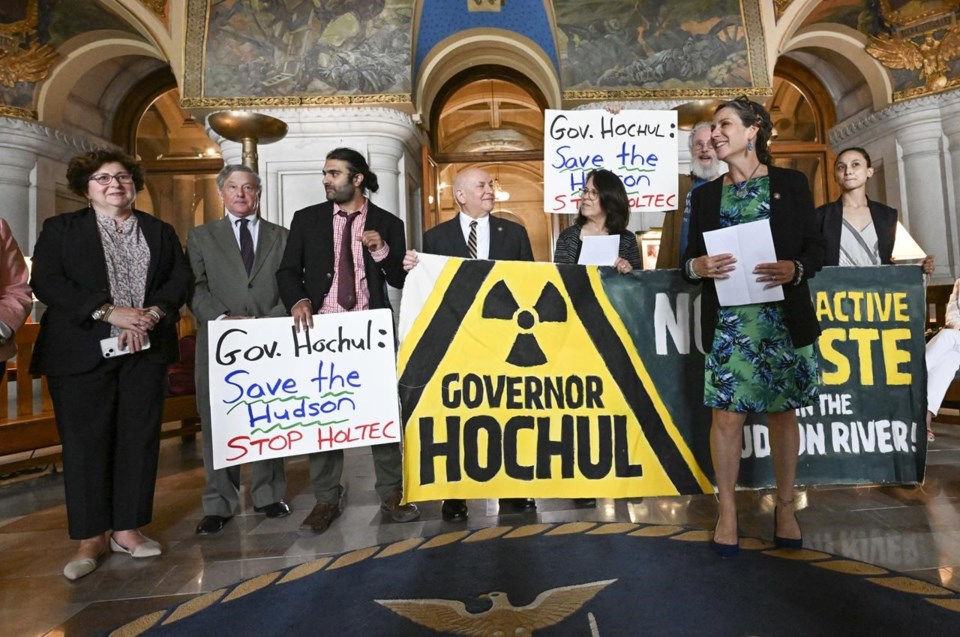Sitting along the Hudson River near New York City, the Indian Point nuclear plant repeatedly attracted controversy during the decades it generated electricity.
Two years after its shutdown, it still is.
The latest flashpoint revolves around plans to release 1.3 million gallons of water with traces of radioactive tritium into the river as part of the plant's decommissioning.
Supporters of the planned releases say they are just like those made when Indian Point was producing power and that the concentration of tritium has been far below federal standards.
But opponents along the river question the health and safety claims. They say the releases of radioactive water could be a step back for a once notoriously polluted river that is now a popular summer attraction for sailors, kayakers and swimmers.
Communities along the river have already passed resolutions opposing the discharges, and an online petition has gathered more than 440,000 signatures. On Tuesday, a bill sponsored by two Hudson Valley Democrats that would ban radiological discharges into the river was approved by state Assembly.
“It leaves a bad taste in your mouth ... the idea that we would be polluting our beautiful Hudson River with waste when we’ve spent so many years trying to clean it up. This shouldn’t be a dumping ground," Assembly member Dana Levenberg said at a state Capitol rally for her bill before the debate.
The bill, approved by the state Senate earlier this month, is opposed by some labor officials, who say it could interrupt the decommissioning and cause layoffs.
The bill will be sent to Gov. Kathy Hochul, who has not said whether she supports the measure.
Indian Point Energy Center generated about a quarter of the electricity used in New York City and suburban Westchester County until its two reactors were shut down in 2020 and 2021.
Critics had called for its closure for years, claiming a major nuclear accident or a terror strike on the plant — just 25 miles (40 kilometers) from the city — could be devastating. Those critics also said the plant had a spotty environmental and safety record.
Indian Point was fully shut down in 2021 and was transferred to Holtec International for decommissioning, which is projected to take 12 years and cost $2.3 billion.
Holtec is allowed to discharge water from spent fuel pools and other parts of the plant into the river as part of the decommissioning. Some water contains tritium, which occurs naturally in the environment and is a common byproduct of nuclear plant operations.
Holtec currently plans to begin a release into the river as early as September.
Similar releases are made by other nuclear plants, as well as hospitals and wastewater treatment facilities, Holtec spokesman Patrick O’Brien said. The Hudson releases have been safe and have had “very, very low” levels of tritium, he said.
“Any headline that’s going to say ‘radioactive’ is going to scare people. And I understand that. It takes a lot of education,” O'Brien said.
But critics say the release of any radioactive material into the Hudson should be avoided if there are viable alternatives. Tracy Brown, president of the environmental group Riverkeeper, said storing the water on-site for 12 years or so would give Holtec time to explore long-term options to separate the tritium.
“We’re pretty confident that something better is going to come along,” she said.
O'Brien said river discharges remain the “preferred option” for Holtec.
The bill approved by the Legislature would force another solution by making it unlawful to discharge any radiological substance into the Hudson River in connection to nuclear plant decommissioning. Sponsors say the discharge of nuclear waste into the river poses a substantial risk to local real estate values and economic development.
“Even though this bill doesn’t discuss environmental or health impacts, the public perception is tied to what they believe ... could actually happen to them if they were to swim, boat, paddle or live on and dip their toes into the Hudson River,” Levenberg said during the debate.
Republican Assembly member Andy Goodell noted the long history of releases from the plant.
“It didn’t create a problem then,” he said. “It’s not going to create a problem now.”
O'Brien said a ban on river discharges could lead to layoffs among the hundreds of decommissioning workers because it would require work to be re-sequenced. The argument has been amplified by some labor groups, with the North Atlantic States Regional Council of Carpenters calling the bill “job-killing legislation.”
Proponents of the bill say the layoff threats are a scare tactic.
__
Maysoon Khan contributed. Khan is a corps member for the Associated Press/Report for America Statehouse News Initiative. Report for America is a nonprofit national service program that places journalists in local newsrooms to report on undercovered issues.
Michael Hill, The Associated Press



